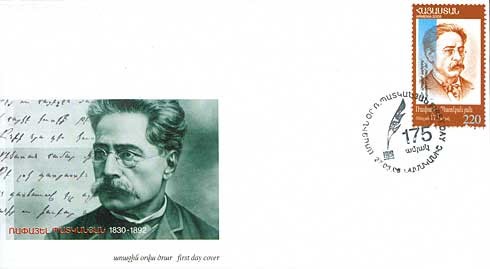Birth of Raphael Patkanian (November 20, 1830)

Raphael Patkanian, also known by his penname of Gamar-Katipa, was one of the most prominent figures of patriotic poetry in the Eastern Armenian world. Some of his works have become the lyrics to songs that are popular to date.
Patkanian was born on November 20, 1830, in Nor Nakhichevan, in the Rostov-on-Don region. He was the son of noted poet, publicist and activist Gabriel Patkanian. He received his elementary education at his father’s school and attended the Lazarian Institute in Moscow in 1843-49. In 1850, he moved to Tiflis.
His first works were published in 1850-51 in the “Ararat” weekly run by his father: “An Armenian exile in Paris,” “The death of patriarch Zarmayr” (long poems), “Dusk songs to peasants” (poems). In the first work, Patkanian has identified the figure of the last king of Cilicia, Levon V, with the concepts of homeland, nation, and national consciousness, addressing the issues of the independence of the homeland and freeing Armenia from foreign rule. The second romance, drawn from the oldest era of Armenian history (according to Movses Khorenatsi, patriarch Zarmayr took part in the Trojan War), can also be seen as a patriotic ballad. Patkanian is considered one of the founders of the Armenian political poetry.
In 1851, he studied at the University of Dorpat (modern-day Tartu, Estonia), where he wrote about poetry about joy, wine, and praises of the faraway homeland. That same year he transferred to the Faculty of Medicine in Moscow. In 1852, he founded the Gamar Katipa society with students Gevorg Kananian and Misak Timurian (the name has been formed with the initials of the first name and family name of each member). To publish Gamar-Katipa’s pamphlets, Patkanian moved to St. Petersburg, joining the Armenian-Georgian-Tatar department of the local university’s Oriental School, from which he graduated in 1866. In 1855, Gamar Katipa’s first booklet was published, with the motto “Write the way they speak, speak the way they write.”
Patkanian has sought to reflect in his writing the accurate and living voice of the people. This effort can be appreciated in his well-known poems “The tears of Arax” and “The death of the brave Vardan Mamikonian,” both written in 1856. He adopted the name of the short-lived Gamar Katipa society as his own literary pen name. In 1857, Patkanian joined the “Young Armenia” group, which pursued the liberation of Armenia from Turkish rule. In 1863-64 he published the “Hyusis” (“North”) weekly, where he described episodes from the battle of Zeytun (1862). In 1864, he published “Poems,” his first book.
In 1866, he went to Nor Nakhichevan, where alongside his educational work he wrote a number of pieces in the local dialect. In 1875, the news of the uprising of the Slavs in Herzegovina and Bosnia against Turkish tyranny inspired Patkanian to write the “Free songs” series of poems. He continued to create in the same spirit even after the strong disappointment that followed the Congress of Berlin (1878).
In 1880, thanks to Patkanian’s efforts, a school of arts and crafts was founded in Nor Nakhichevan, which enabled children from poor families to learn trades along with elementary education as well as receiving free meals and clothing. Patkanian was the principal of this school until his death. He published the “Children’s songs” (1880) and “Poems” (1881) volumes). He has also written a number of school textbooks, as well as satirical short stories in the dialect of Nor Nakhichevan.
He passed away on September 3, 1892, in Nor Nakhichevan. His books “Poems” and the three-volume “Select Works” were published posthumously, in 1893 and 1893-1904, respectively.
